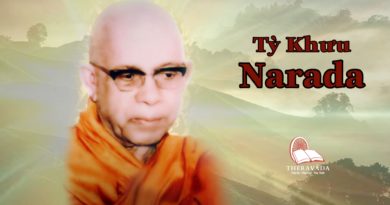THE PATTHANUDDESA DIPANI – CHAPTER 10: PUREJATA-PACCAYA
THE PATTHANUDDESA DIPANI – CHAPTER 10: PUREJATA-PACCAYA
The relation of pre-existence is of three kinds: basic pre-existence, objective pre-existence, and basic objective pre-existence.
Of these, the first and the last have already been dealt with under the heading of Nissaya in the foregoing section on the Nissaya-relation.
Objective pre-existence is the name given to the present eighteen, kinds of material qualities of the determined class (nipphanna). Of these, the present five objects (visible form, sound, and so forth) are causally related, always by way of objective pre-existence, to those thoughts, which are capable of taking part in the five-door processes. Just as the sound of the violin only arises when it is played with a bow, and the sounding necessitates the pre-existence of both the violin strings and the violin bow, so also those thoughts, which take part in the five-door processes, spring into being owing to the presentation of the five objects of sense at the five doors, which are no other than the five bases. The presentation is possible only when the door and the object are in their static stages. Those five objects not only present themselves at the five doors of the five senses at that static period, but they also present themselves at the mind-door. On this account, the life-continuum vibrates for two moments, and then ceases; and the cessation of the life-continuum gives rise to a consciousness-series. This being so, the consciousness-series in any process cannot arise without the pre-existence of the objects and of the bases. The eighteen kinds of determined material qualities are either past, because they have ceased, or future, because they have not yet arisen, or present, inasmuch as they are still existing. All of them, without distinction, may be objects of the mind-door cognitions. But, among them, only the present objects act as objective pre-existence. And if a thing in any distant place, or concealed from sight, itself existing, becomes an object of mind, it also may be called a present object.
[End of the Purejata-Relation]









